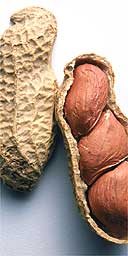
Hundreds of babies are to be fed peanut extracts in a clinical trial to identify factors that put people at risk of developing a dangerous allergy to the nuts in childhood.
Researchers at King's College London and Guy's and St Thomas' hospitals are seeking 480 babies for the trial, which is due to run for seven years, starting early next year.
Peanut allergy is one of the most dangerous of food allergies, and cases among children have doubled in the past 10 years, with one in 70 schoolchildren now affected. Reasons for the rise are unclear.
Previous studies have suggested that consuming peanuts during the first year of life increases the chance of children going on to develop peanut allergy, but more recent evidence has found the opposite, with children shown to be protected if the nuts are introduced earlier.
The trial aims to test whether including peanuts in the diets of very young children changes their risk of developing the allergy. The researchers are seeking babies between four and 11 months old who are known to have eczema and have tested positive for egg allergy, because they have a much increased risk of becoming allergic to peanuts at school age.
Half the babies recruited to the trial will not be allowed any products containing peanuts, and the other half will be fed the equivalent of 10 to 20 peanuts a week for three years, through peanut butter and peanut soup. Whole peanuts will not be used because of the potential choking hazard.
A quarter of babies with eczema who are also allergic to eggs go on to develop peanut allergy. For some even touching a peanut can cause swelling, and when eaten reactions can be so extreme as to be fatal.
Professor Gideon Lack, at King's College London, said: "One child in almost every classroom has to carry an adrenaline injection with them in case they suffer anaphylactic shock because of peanut allergy. Just to sit back and accept the situation would be unethical."
The children will be closely monitored by teams of nurses and dietitians and assessed for peanut allergy at five years old.
The results are expected to pave the way for treatments for children who already suffer from peanut allergy.

